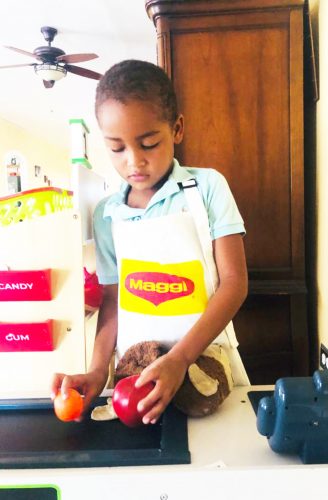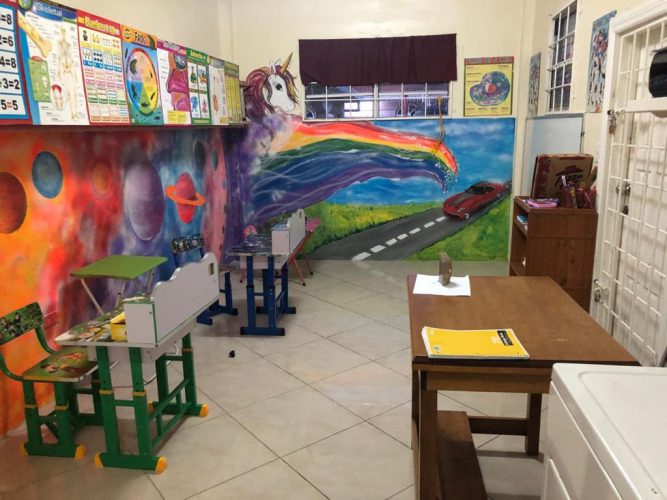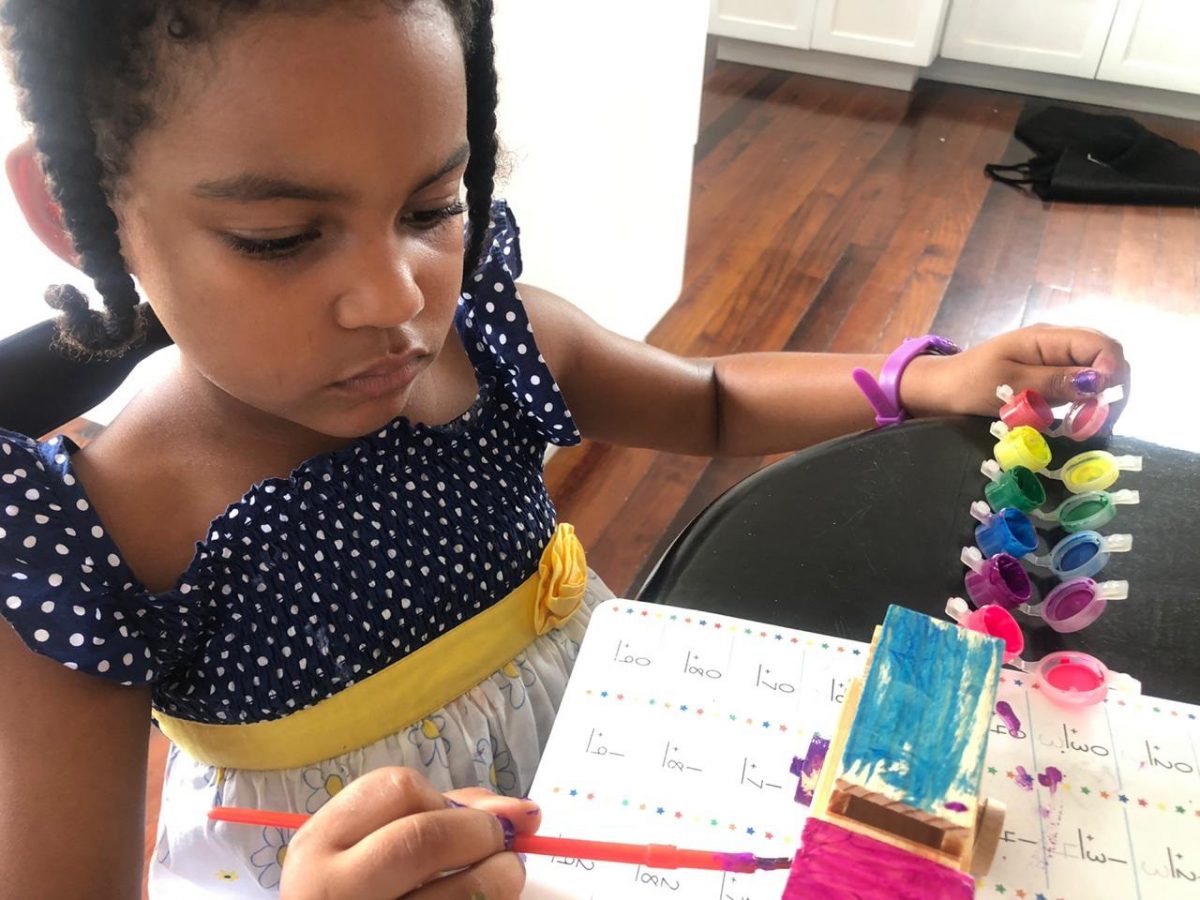With remote learning being forced upon parents throughout the world because of the novel coronavirus, many are still adjusting to their new roles in the education of their children. In Guyana, it is no different. Some parents may just want some more support and are anxiously awaiting the physical reopening of schools; some may worry that this may be a long-term arrangement due to the continued rise in COVID-19 cases; and some might even be welcoming playing a greater role in the education of their children. Then there are others for whom the experience is not new as they have been homeschooling their children long before the pandemic.
Candice Rowena Ramessar, a former high school teacher of Biology and Environmental Science in the United States, and Adriana (only name given) are two parents who fall into the latter category. Ramessar has homeschooled both of her children, one 16 and the other five years old, and she told Stabroek Weekend that she fell in love with the concept after she read a magazine article long before she had children. Adriana has also homeschooled her two children and for her the need arose because they have special needs that were not being catered for in the traditional school system.

According to Ramessar, her family started homeschooling in 2006 whilst living in the US and have since done so in Jamaica, St Vincent and the Grenadines and now Guyana.
“Before the pandemic, we longed for a homeschooling support group in Guyana but never met other homeschoolers. After the pandemic and everyone was forced into home education, talks of homeschooling began among several families,” Ramessar said.
Consequently, she started to reach out to people that she knew as colleagues, associates and friends and was surprised by how many of them were interested both as a crisis measure and some who were planning on continuing to homeschool after things return to normalcy. A letter in the Stabroek News also alerted persons and two information sessions were held and from there a group was formed.

The Guyana Homeschool Association, which has 19 members, according to its organisers, is being established as a network organisation for persons homeschooling and interested in homeschooling in Guyana. “We are here to advance and protect the right to homeschool,” the association says, while adding that its mission is to become the national representative body for homeschooling in Guyana.
It is hoped that homeschooling families in Guyana will be assisted to navigate the homeschooling world through representation, information, networking and support.
‘Passion and dedication’
Ramessar said while many persons may think that homeschooling is for the affluent, it is not.
On the issue of affordability of homeschooling, she noted she has lived in Jamaica where many persons homeschool quite successfully, and they were not rich people. “I think the passion and dedication are much more important than financial resources because you can use the library…and you can use the natural environment and the resources around you in order to be able to teach your child about anything,” she noted.
“Passion and dedication are more important than resources. It can be done using creative methods. One of the advantages of being in Guyana is there is an abundance of nature and sunlight 365 days of the year. This offers much opportunity for learning from nature… The parents will have to spend the time to re-learn and un-learn and then guide their children’s learning. Obviously, having financial resources has never hindered any action, including homeschooling,” Ramessar added.
She said parents can be very creative with limited resources and still homeschool their children successfully, while pointing out that children can be taught chemistry from cooking in the kitchen.
Adriana concurred with Ramessar on this, before adding that Guyana has a lot of things that are very interesting even though with COVID-19 many persons are now restricted from being out and about. She shared that when her children were younger she took them to the national museum on many occasions as there is so much to learn from what is displayed and then there is the value of helping children to identify birds in the garden.
“It might sound avant-garde… but if you don’t know your own home area, your own culture area then how do you get grounded in your community? And so all of those things have value, none of those things is a waste of time,” Adriana said.
Ramessar also explained that there are many approaches to homeschooling, some more resource-intensive than others. And, of course, it provides flexibility if the parent or parents are working full time.
All aspects
And Adriana pointed out that traditional schooling does not necessarily address all of the facets of the child and she gave the example of children with mental health issues who are almost not catered for in regular schools.
“Homeschooling is child-centred. It takes into considerations all aspects of the child, emotional, physical, psychological etc. It also allows the child to guide the education process or journey. This is an attractive quality for most persons in the group and in general. Parents also have a lot of say in their child’s education in homeschooling. Both child and parents can focus on their interests and learning becomes more engaging and fun,” she posited.
And for her that was a particularly attractive quality, since having children who are empathetic, global citizens, and environmental stewards is important.
“I can focus on those things in homeschooling and less time on rote learning. In addition, you can adapt teaching to how the child learns. Learning can also happen 24/7 for persons who are homeschooling,” she added.
“I think that homeschooling is a way to support and help any child that might have difficulty in that area but still strive academically and so we have to look at the whole child,” she noted.
Asked about the issue of socialisation among peers, Ramessar acknowledged that it is a question that is often asked, and she noted that she is homeschooling a five-year-old and she is unsure of anyone who is more social than him.
“Having homeschooled one child who is 16 and homeschooling another one, homeschoolers create opportunities for their children to socialise. They socialise with their cousins, their brothers, their sisters, other children in the community and friends of the family. I have never met any homeschooler who has been short of socialisation, even the ones who live in remote areas still find people that they have encounters with,” she said.
According to Ramessar, they are usually very social, but they may choose to be introverts and accepting that as their personality, they should be worked with using that approach.
Adriana said one of her aims, once it is safe to socialise again, is to have homeschooling families create their own field trips and their own activities where their fellow homeschoolers can be a part and a community can be created.
Fledgling network
Ramessar said she is working on putting resources together to assist persons to better homeschool their children as she noted that there is so much out there as she believes for persons who are thinking about taking this route resources should not be a challenge. She did, however, acknowledge that there are families who cannot afford digital devices or live in remote areas where they may not have access to internet and that the economics of the family would also have to be looked at.
“Eventually, I, personally, would like us to get to a stage where we can assist or provide persons with access to the information, if not the actual information,” she said.
At present, the association shares resources and moral support via its WhatsApp group. “We are getting to know each other at this stage as the network is fledgling. However, after we have returned to normalcy it is our intention to get together physically and have homeschooling field trips…,” Ramessar said.
She said they are also exploring the possibilities of families with similar interests and children in the same age group forming “pods” for activities. She explained that a homeschool pod is a small cluster of families that agree to similar quarantine protocols and work together on educational activities. And the possibilities of some online classes for children of like interests are being looked into.
There is a Guyanese family from St Lucia homeschooling seven children, and they homeschooled prior to the pandemic.
Asked about issues faced by members, Ramessar said that there was one parent who is a frontline worker who contacted them for some assistance, others are just getting used to organising their children’s learning and choosing the curriculum.
She said that there is a lot of information, a lot of it free, out there, and persons can easily get overwhelmed by it.
And whilst the association is not in the business of converting persons to homeschooling, if there are people who are interested, they can make contact for ideas on how to do so in a Guyanese context and on a budget.
Persons can make contact via schoolingathomegy@gmail.com or 604-2216.






